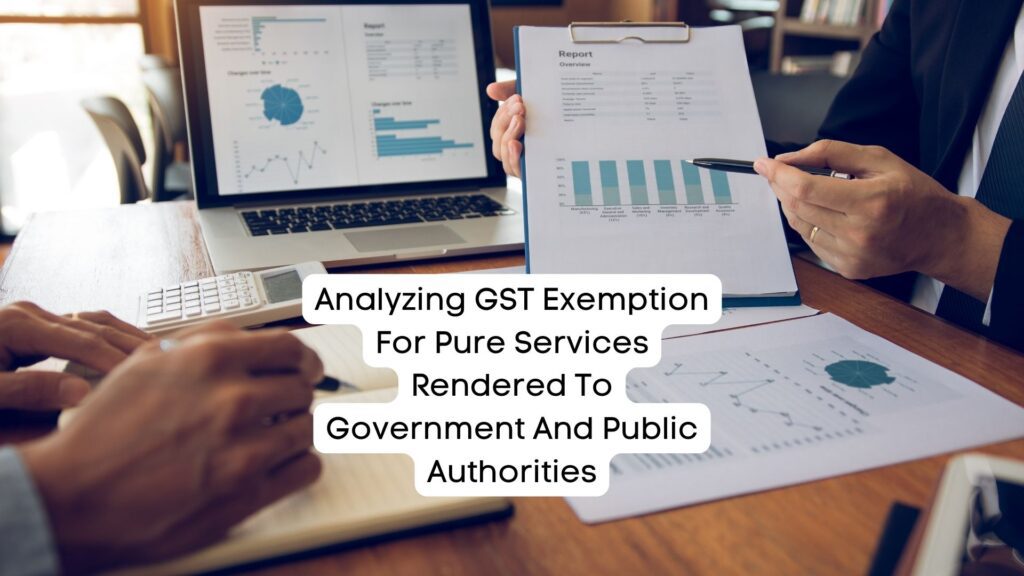
22 Feb Analyzing GST Exemption for Pure Services Rendered to Government and Public Authorities

Introduction:
Navigating through the complexities of Goods and Services Tax (GST) entails a comprehensive understanding of various exemptions and thresholds, particularly concerning pure services provided to government bodies and public authorities. This article delves into the intricacies of GST exemptions on pure services and elucidates the pertinent definitions and provisions.
Definition of Public Authority:
The term “public authority” holds significant importance in the realm of taxation, as per Section 2(h) of the Right to Information Act, 2005. It encompasses institutions established through constitutional mandates, legislative enactments, or governmental notifications. This definition also extends to bodies significantly financed or controlled by the government, including non-governmental organizations receiving substantial government funding.
Understanding Pure Services under GST:
While the concept of “pure service” lacks a precise definition within GST statutes, it can be construed as services devoid of any involvement in the supply of goods. Services falling under Schedule II of the CGST Act, 2017, or those not categorized as goods, qualify as pure services. However, services entailing a combination of goods and service elements are not considered pure services for exemption purposes.
Exemption on Pure Services to Government:
The taxation landscape pertaining to pure services rendered to government entities warrants attention, particularly concerning functions delineated under the Constitution. For instance, services provided directly to bodies like municipalities and panchayats, as mandated by Article 243W, qualify for exemption from GST. Conversely, services not directly aligned with constitutional functions are subject to standard tax rates, typically at 18%.
Application of Constitutional Provisions (Article 243G and 243W):
Constitutional provisions under Article 243G and 243W delineate the roles and powers of panchayats and municipalities, respectively, in service provision. These entities hold delegated authority to offer essential services like water supply, sanitation, and infrastructure development. Services directly linked to these constitutional functions are eligible for GST exemption, ensuring effective decentralization of governance and service delivery.
Advance Rulings and Case Laws:
The application of GST exemptions on pure services is further elucidated through advance rulings and judicial precedents. Cases such as ‘Tamil Nadu Water Investment Company Limited’ underscore the eligibility criteria for exemption, emphasizing the alignment of services with constitutional mandates. Such rulings provide clarity on interpreting GST provisions concerning pure services rendered to governmental bodies.
Conclusion:
In essence, understanding the nuances of GST exemptions on pure services to government entities and public authorities is indispensable for businesses and service providers. By aligning services with constitutional mandates and regulatory frameworks, entities can leverage tax exemptions while contributing to the efficient delivery of essential services at the grassroots level. This comprehension fosters compliance and facilitates a conducive environment for public-private partnerships in nation-building endeavors.


No Comments